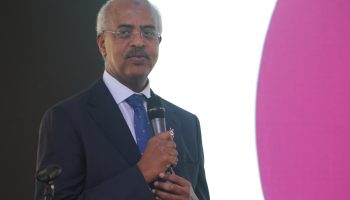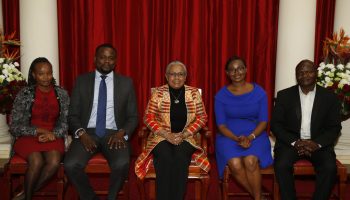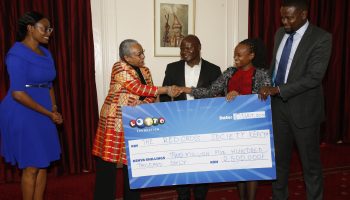- September 23, 2020
- Posted by: p mulee
- Category:
By Reporter
At least 400 adult volunteers will be recruited to participate in the human trials of the Oxford vaccine Covid-19 vaccine in Kenya.
This is after the government gave its approval for the coronavirus vaccine known as ChAdOx1 nCOV-19 to be trialed in the country.
The approval was issued by Pharmacy and Poisons Board but the the National Commission for Science, Technology, and Innovation (Nacosti) is expected to give the final approval for the vaccine trial.
In Kenya, the trials will be carried out in Kilifi county by the Kenya Medical Research Institute in partnership with UK’s Wellcome Trust (Kemri-Wellcome) and is expected to run for two years. Kenya and South Africa are the only counties in Africa conducting trials on the Oxford/Astrazeneca-developed vaccine.
“The study will only enroll 400 healthcare workers including doctors, nurses, clinical officers, pharmacists, mortuary attendants, and allied healthcare professionals” says the protocol.
In addition, other frontline workers who will be enrolled for the trial will include truck drivers and security personnel over the age of 18 years. The study involves two phases. In the first phase 40 participants will be recruited, followed by 360 volunteers recruited in the second phase. To ensure safety of participants, Kemri said participants will be closely followed up for 12 months after getting the vaccine.
The study will be a randomised controlled trial, in which two sets of participants will be enrolled. One set will receive the actual vaccine, while the other (the control group) will get a rabies vaccine as a placebo. The choice of the rabies vaccine, according to a source privy to the matter is meant to protect the control group from rabies, another deadly virus spread to people from the saliva of infected animals
“If global data demonstrates safety and efficacy of this trial vaccine, the control group that received a rabies vaccine will be offered the ChAdOx1 nCOV-19 vaccine, once all appropriate protocols have been followed,” Kemri said.
Explaining why the trial is important, Kemri said that a vaccine which works in one population does not necessarily work in all populations.
“Therefore it is important to find out whether the trial vaccine works among Kenyan populations to ensure that Kenyans can benefit from the vaccine if it proves to be successful.”
Apart from Kilifi, testing might be expanded to Mombasa County, the research institution said.
“Effective follow up is very critical in a phase 1 and 2 trial, and this follow up is easier in a Demographic Surveillance System, which we have in Kilifi,” explained Kemri.
Trials on the vaccine had been paused last week after a participant had a suspected adverse reaction in the United Kingdom. However, the tests were resumed in the UK, Brazil, India and South Africa, but is still on pause in America. Scientists have demanded to know why AstraZeneca’s trial of its Covid-19 vaccine is still on hold in the US while it has been restarted elsewhere, worrying it could damage public trust. In the US it has been on hold for almost two weeks, while trials in other countries including the UK have restarted.
The University of Oxford, which developed the AstraZeneca vaccine, told participants in resumed trials that the “unexplained neurological symptoms” were either unlikely to be associated with the vaccine or that there was “insufficient evidence” to say whether they were or were not associated, and so independent reviewers had recommended that vaccinations continue.
A vaccine trial is a clinical testing that aims at establishing the safety and efficacy of a vaccine before it is licensed for use. To prove a vaccine works, people taking part in a study must at some point be exposed to the virus. Large trials maximises the likelihood the study will capture people who span the gamut of behaviour, jobs and lifestyles.
Janssen Pharmaceutical, a pharmaceutical company headquartered in Beerse, Belgium and owned by American multinational Johnson & Johnson Wednesday started wide-scale testing for its vaccine, involving approximately 60,000 volunteers globally. AstraZeneca, Pfizer and Moderna already have vaccine candidates being tested in large studies in the United States. Novavax should start its study later this fall.
The reason the trials are so large has to do with the complications of getting an accurate analysis of whether the vaccine works — and how the scientists and public health officials define “works.”

















This is very interesting, You’re a very skilled blogger.
I’ve joined your feed and look forward to seeking more of your magnificent post.
Also, I have shared your web site in my social networks!
Hi there, just wanted to say, I liked this blog post.
It was helpful. Keep on posting!
My spouse and I stumbled over here by a different
web address and thought I should check things out.
I like what I see so now i’m following you. Look forward to
looking over your web page repeatedly.
Does your website have a contact page? I’m having a tough time locating it but,
I’d like to send you an e-mail. I’ve got some ideas for your blog you might
be interested in hearing. Either way, great website and I look
forward to seeing it improve over time.
Greetings! Very useful advice in this particular post!
It is the little changes that make the greatest changes.
Thanks for sharing!
My spouse and I stumbled over here different website and thought
I might check things out. I like what I see so now i’m following you.
Look forward to looking into your web page again.